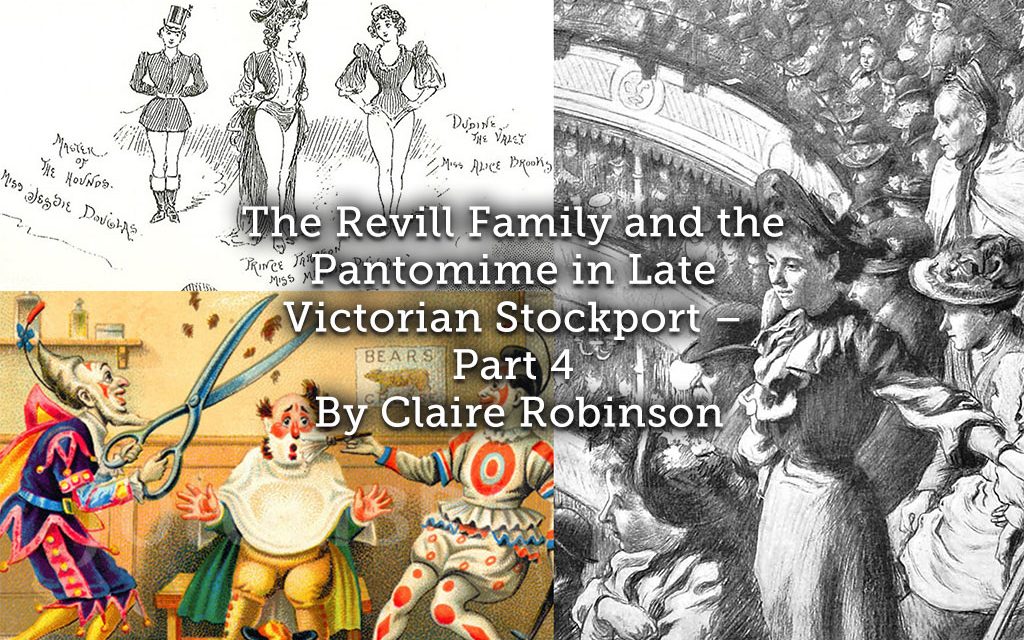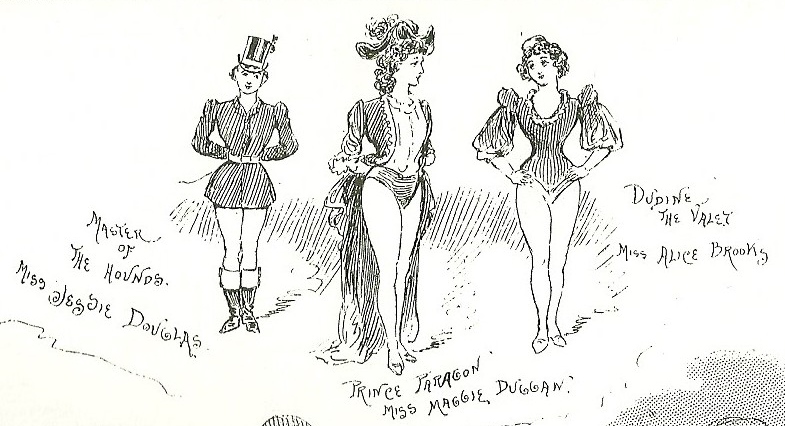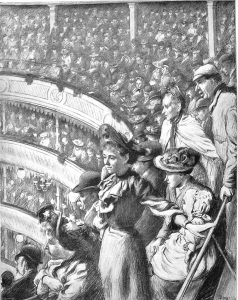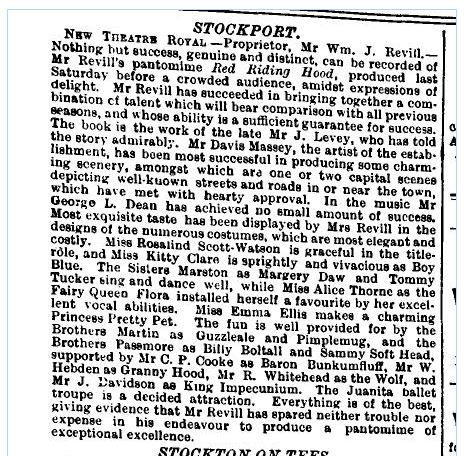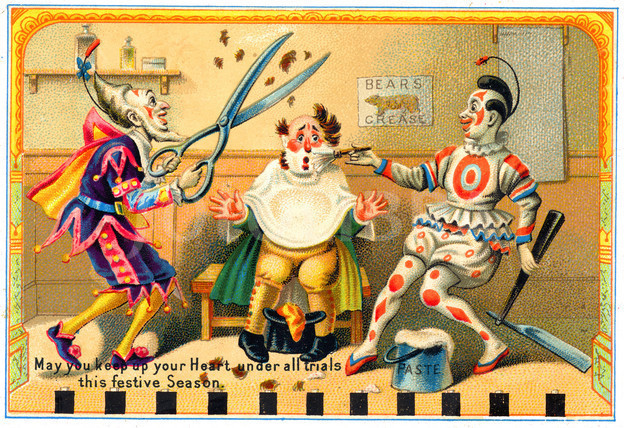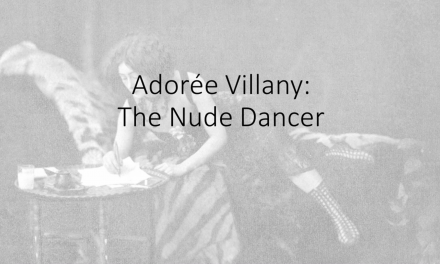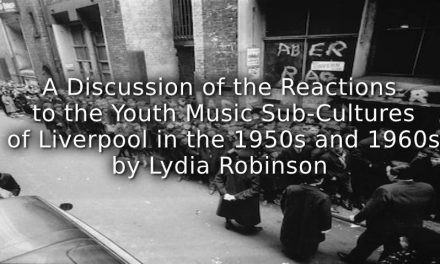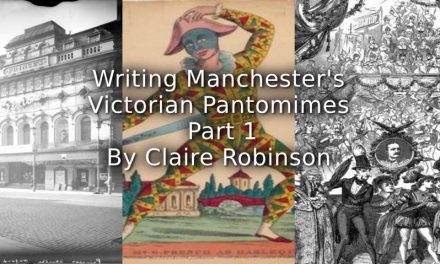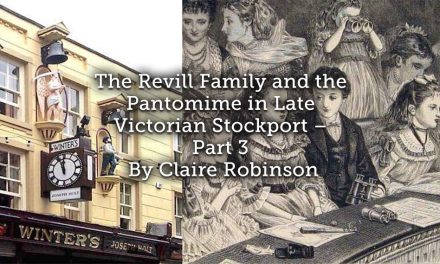Audiences and Reviews ~ Little Red Riding Hood (1891-92 Season)
Part 1 see – https://goo.gl/xH6FwX, Part 2 see – https://goo.gl/UTL4BB, Part 3 see – https://goo.gl/bczFGu
The Performance
The lights in the ‘’sunlight,’’ as the gas chandelier in the ceiling was called, would gradually get dimmer, and the orchestra would strike up with the usual medley of songs of the day. There was general applause and – oh yes, I nearly forgot to tell you that the pantomime was called ‘’Little Red Riding Hood,’’ and the act drop would rise on the demon scene with the chorus of demons singing:
‘’Hail, all hail, great king of darkness
At thy fiery throne we call
Scatter seeds of evil o’er us,
Hear, O hear our demon call.’’
The demon wolf and baron plot, with Little Red Riding hood as the target for that night, but the fairy queen enters amid general applause. ‘’I’ll keep watch on you, so be prepared.’’ ‘’We defy your power.’’ ‘’Defy away, old friend.’’ ‘’Then it’s war between us.’’ ‘’Yes, war to the bitter end.’’
A song medley and dance would take the demon scene away, to reveal a beautiful landscape with a rustic ballet in progress where we are introduced to Granny’s scholars. There was the meeting between Boy Blue and Red Riding Hood, and it also happened to be rent day, with an order ‘’Pay or turn out,’’ but, wonderful to relate, the rent is found, and a jolly chorus brings down another front cloth, where the comedians get to work.
Scene four, strange to say, shows the landing of St. George and the Seven Companions of Christendom, all disembarking from the royal barge at anchor. What this has got to do with Red Riding Hood we shall have to wait and see. Oh yes, Red Riding Hood appeals to St George for protection, which is promised despite the howling of the wolf. The scene changes to the fairy glen in winter, with a beautiful snow ballet in which Little Red Riding Hood is taken to fairyland in a sleigh. The curtain fell for a ten minutes interval.
- Detail from an illustration of the pantomime Cinderella presented at the Theatre Royal in Manchester during the same season, 1891-92, and therefore competing with Stockport for audience share.
INTERVAL
The orchestra is coming back and George L. Dean, the conductor, gets his usual round of applause. The curtain, which had been changed for the view of Haddon Hall to the usual advertisement drop, rises on the interior of Granny’s cottage with the chasing of Granny by the wicked wolf. Granny gets out of the window, and the wolf goes to bed. Enter, amid little squeals from the children, Little Red Riding hood, who says ‘’Oh Granny, what big eyes and how they stare, and gracious me this big ear and that there ‘air!’’ and so on. The wolf jumps out of bed and seizes Red Riding Hood. Enter the Seven Knights of Christendom with their chorus girls escorts and, of course, Granny.
Transformation
A grand medley of the popular songs and all dance off for the grand transformation scene, ‘’The MARBLE HALL and FAIRY’S BOWER.’’ How our eyes glowed as scene after scene of dazzling colour was revealed showing all the beautiful girls posing and flying about the stage. Then the gong sounded, the signal for the red, green and blue fire in pans to be set ablaze, filling the theatre with sulphuric fumes.
On to the usual Harlequinade. The early Harlequinade was a very elaborate affair, usually taking up about half of the pantomime’s time, but in later years it fell out of favour and spectacle took its place, but we children loved every minute of it. The curtain came down finally, to our sorrow, and all was over. ‘’God Save the Queen’’ ‘’Pass along please,’’ from the attendants, and we walked home.
- An audience at the Victoria Theatre, London (1893)
Memoirs are mediated by what the author chooses to tell the reader and inevitably coloured by their own opinions and wishes. In particular here, there is the danger of the account being romanticised by William Revill Jr’s fond memories of his family and the family business. This potential for the author to be an unreliable witness must always be taken into account by the researcher. However, an examination of newspaper reviews giving an alternative view of this production of Little Red Riding Hood compare favourably with Revill’s claims.
The Era was a highly respected national weekly periodical concerned with cultural matters. Their unnamed reviewer praised William J Revill and his staff saying
Everything is of the best, giving evidence that Mr Revill has spared neither trouble nor expense on his endeavour to a pantomime of exceptional excellence.
- Review of Little Red Riding Hood from The Era, 2 January 1892
William J Revill and his descendents served the people of Stockport until 1958 and they were well known by the members of their regular audience. William Revill Jr reflected on audience relations writing
The service was equalled only by the loyalty of the patrons. One man told me that he had been a regular patron for 80 years, from the days when he was carried into the theatre by his mother.
As a boy I stood with my grandfather at the foot of the circle steps – it was, by the way, his hard and fast rule to say ‘’good night’’ to his patrons after the performance. My father, myself and my brothers have endeavoured to do the same. What has happened to this friendly contact between manager and audience. It seems to have disappeared with the advent of the cinema, much to the surprise, and I feel sure appreciation of the outgoing patrons. To stand where I could be seen, to raise my hat to the ladies with a ‘’good night’’ which invariably would be returned.
The success of Little Red Riding Hood in Stockport at Christmas 1891 and ongoing popularity of William J Revill’s theatre, along with the respect in which he was held by those in his industry, are clear from the accounts discussed above. As a case study, his grandson’s memoirs provide an excellent first hand and fascinating account of a typical Victorian production of a pantomime in the spectacular form.
-
Christmas card depicting a typical harlequinade scene of mischief in a barber’s shop
(date unknown)
Article © Claire Robinson
References
Stockport Advertiser, 25th December 1958, 11th September 1959
The Era, 2 January 1892

